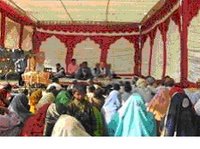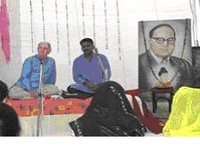Dhamma teaching tour in Northern India
 Subhuti and the Dhammakranti ‘outreach’ team have just finished a long and packed Dhamma teaching tour of Northern India. This followed immediately from the massive ‘Jumbo’ retreat at Bodh Gaya, which we hope to report on shortly – we are waiting for photos and some more eye-witness reports.
Subhuti and the Dhammakranti ‘outreach’ team have just finished a long and packed Dhamma teaching tour of Northern India. This followed immediately from the massive ‘Jumbo’ retreat at Bodh Gaya, which we hope to report on shortly – we are waiting for photos and some more eye-witness reports.The tour began in Kusinagar, site of the Buddha’s Mahaparinirvana, with a public talk by Subhuti in the Shrine Hall of the monastery. .Maitriveer Nagarjun, one of the organizers of the Dhammakranti project, commented “The programme was especially wonderful due to the presence of 80 participants of the Dhammakranti Retreat, which had just finished”. Subhuti spoke here on the importance of ethics, or shila, in the creation of a just society. He commented that these days many people are aware of the name Buddha, but unaware of his teachings.
The following day saw a public talk in a small remote village near Kusinagar, where most of the local Buddhists were ‘Dalit’ followers of Dr. Ambedkar and, as such, leading lives typical of the millions of agricultural laborers in India – hand-to-mouth daily wages, illiterate, and poor. Subhuti spoke here of the disease of inequality and its roots in the Indian idea of Caste, which he described as being deeply rooted in the mind – meaning that liberation would come from training the mind to reach, instead, a state of equality and freedom. He explained also Dr. Ambedkar’s dream of a casteless society based on the Buddhist values of Liberty, Equality and Fraternity.
 From there the party traveled for three days 1,000 miles West, where the first ever Dhammakranti retreat was held in the Punjab, in a school run by some Mitras in the town of Phulpur. Some 90 people attended, the school was surrounded by green fields and silence, making it easy to deepen into the atmosphere of retreat. At the end a local school principal and others became Mitras in a ceremony to deepen their links with the Dhamma and our community. The retreat was specifically for new Buddhists, exploring ways they could effectively deepen their sense of Dhamma practice and spiritual community despite problems of isolation and remoteness.
From there the party traveled for three days 1,000 miles West, where the first ever Dhammakranti retreat was held in the Punjab, in a school run by some Mitras in the town of Phulpur. Some 90 people attended, the school was surrounded by green fields and silence, making it easy to deepen into the atmosphere of retreat. At the end a local school principal and others became Mitras in a ceremony to deepen their links with the Dhamma and our community. The retreat was specifically for new Buddhists, exploring ways they could effectively deepen their sense of Dhamma practice and spiritual community despite problems of isolation and remoteness.From there to the neighboring state of Rajasthan, another first for Dhammakranti. Subhuti gave a public talk at Alwar, to an audience of Buddhists – many ‘born Buddhists’ whose communities had followed Dr. Ambedkar into Buddhism in the great conversions of 1956 – but who had had no instruction since, and who lived, tragically, in a state which topped the list of Indian caste-based atrocities. Subhuti exhorted his audience to bring into being the Buddhist ideal of a ‘Casteless People’ - to set the path for a casteless, peaceful, and just society for all, and celebrated the life of Dr. Ambedkar, whose life was devoted to just that.
After an evening meeting in Delhi, the party moved on to yet another first, the state of Haryana, 70 km east of Delhi, and another retreat, this time with over 150 people attending, both men and women. This retreat especially benefitted from there being people from many different States present - from Punjab, Rajasthan and U.P. (Uttar Pradesh). This retreat focused especially on meditation, as a system training bringing peace, and also as a potent agent for social transformation.
You can read a fuller account of the tour here. For the Dhammakranti team, life continues biusy - preparations are beginning for their second All-India Buddhist Youth Conference at Bor Dharan, our retreat centre near Nagpur, where more than 500 are expected.
Click here for a map of TBMSG groups in India.
Labels: Dhammakranti, Dharmaduta, India, Subhuti

 rss
rss
0 Comments:
Post a Comment
<< Home